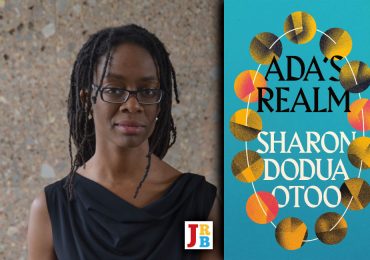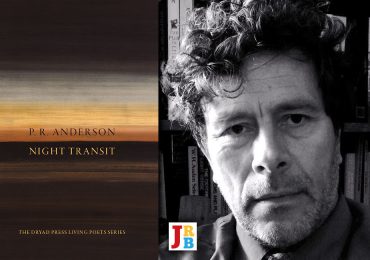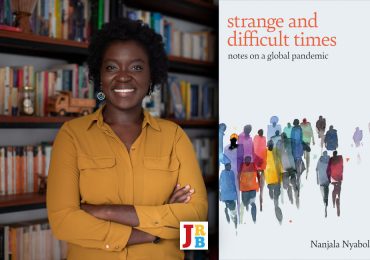Niq Mhlongo on searching for stories during a pandemic.
I arrive in Berlin on Monday, 10 February 2020. It is a cold, dark, winter morning. I’m picked up at the Tegel Airport by Sebastian from DAAD, the German Academic Exchange Service, my hosts. I am looking forward to starting my one-year fellowship in Berlin as one of DAAD’s artists in residence. Every year, DAAD offers a prestigious residency fellowship to artists, so that they can work uninterrupted. I need this break so much, in order to complete the manuscript of my new novel, Paradise in Gaza. I also need space to edit a new collection of short stories called Jozi Noir, which features a number of South African authors. (These books will be out in October and November 2020, respectively.)
Back home in South Africa my routine was interrupted by constant electricity loadshedding, which disturbed the flow of my writing, and even gave me writer’s block, as I couldn’t plan my writing schedule properly. Here in Berlin I plan to write any time I can. I’m also happy at the thought of meeting the writers, painters, film directors, poets, music composers from around the world who are also part of the 2020 DAAD fellows. Meeting these people will surely improve my writing.
It’s not my first time in Berlin. I have been here a number of times. I was here in December as a guest of the Goethe-Institute. In 2018 I spent a month over November and December as a writing fellow at the Literarisches Colloquium Berlin (LCB) in Wannsee. I attended the African Book Festival in 2018. My novel Way Back Home was published in German in 2015 by Verlag das Wunderhorn. Berlin is one of those European cities where I always feel welcome. This time I’m looking forward to spending a year in my own apartment. It is at number 13 Spielhagenstrasse in Charlottenburg—a huge, beautiful and nicely located apartment in a quiet street just across Bismark underground station, and not very far from the palace.
The first week, everything is fine, until the deadly coronavirus starts to hit hard in Italy and Spain. Before I came to Berlin, the news about the outbreak of corona was not taken seriously in my home country. There had not been any reported cases. All we heard on television, radio and social media was that people were dying in huge numbers in China, Italy and Spain. The majority of people in South Africa, including myself, never imagined that the virus would affect us directly—and badly—in the next few weeks. My friends were even concerned that I was going to Europe, which was considered the epicentre of the virus.
But I was determined to start a new life as a writer-in-residence in Berlin. It is a fellowship that my friends and fellow scribes, Petina Gappah, Helon Habila and the late Binyavanga Wainaina, had been part of before me. And I have big plans for Berlin besides writing. My friend from London, David Shriver, has booked us tickets for the Bundesliga game between Hertha Berlin and Bayer Leverkusen in May. It will be my first experience of watching a soccer match between two European teams in Europe. The stadium is about ten minutes from my apartment by train. In 2010, David bought us tickets to watch Fulham in London when he heard I was coming to the London Book Fair, but that trip was cancelled as a result of the volcanic eruption in Iceland.
Attending soccer is not the only activity I’m planning to do in Berlin. My favourite rapper from Wu-Tang Clan, GZA, is scheduled to perform in the city in mid-March. I organise with Emeka, my Nigerian friend who is living in Berlin, to go to the gig. I’m also invited to the third African Book Festival in May. I’m looking forward to all these adventures.
Meanwhile, I start my Berlin experience by frequenting the Irish Bar at Zoologischer Garten. Here I meet people from different parts of the world, and it is one of the few places I know near my new home where I can watch soccer games on TV and drink good beer. One cold Saturday in February, late into the night, a group of soccer lovers come in after a game at the Olympiastadion, not far away. In the smoking room, I have a conversation with an FC Werda fan who is wearing two club scarves. He asks me which team I follow in the Bundesliga. I tell him I’m still new in Berlin. He takes off one of his scarves and puts it around my neck. He tells me it is a gift and that he is ‘baptising me’ as a Werda fan. This is the Berlin I came for and wish to experience. It is the Berlin I want to write about, or at least live in while trying to shake my writer’s block.
In my experience, there are two distinct categories of writers. On the one hand, extrovert writers like me go out to places like pubs in search of a good story. I find inspiration by associating with people at bars, soccer grounds, and the street in general. On the other hand, introvert writers wait for a good story to come to them before they decide what to write. They do not socialise a lot, and have a strict writing routine.
On 5 March everything changes. The coronavirus spreads in South Africa and claims its first victim. Everyone at home starts to panic and I’m inundated with messages and calls to find out if I’m safe. In Europe and the United States cases start to rise exponentially. In Italy, the US and Spain there are more than a thousand deaths reported each day. In Berlin, I hear the sad news that more than fifty people that visited a particular pub had been infected with the virus. I start worrying about my Irish Pub visits. Could it be possible that I’m also infected without knowing? For the first time I start thinking about getting sick and dying on foreign soil. Bit by bit, depression sets in. The German government announces lockdown measures to curb the spread of the virus. Restaurants and pubs are closed. Freedom of movement is restricted. I can no longer visit friends and meet people, which are my sources of stories. As an extrovert kind of a writer I’m left exposed and vulnerable. This is not the Berlin I was hoping for.
As more restrictions are imposed, the silence and isolation I feel stretches into what feels like an eternity. I’m confronted by my most intimate terrors. I start missing home, but I cannot go back because travel is banned. I’m confined to Berlin, which has suddenly become strange to me. My hosts, DAAD, do everything they can to make me feel comfortable and allay the fears I am having. A number of DAAD fellows who are supposed to start their residency like me cannot travel to Berlin. Some of those who arrived last year are unable to go back home. There is panic everywhere. Although I have all the support I need, Covid-19 has ingeniously imposed a long silence on me. It is like going from light into a complete darkness.
In the coming weeks several literary festivals that I’m invited to participate in are cancelled: the African Book Festival in Berlin in May, a festival in Switzerland in June, the Gothenburg Book Fair in Sweden in September. I had readings planned in Amsterdam and Belgium. Everything seems to have come to a standstill. I cannot even register as a resident of Berlin, as required by the German law. Depression is setting in, and although I try not to allow it I can feel myself swaying from time to time. At the same time I have to deal with traumatic memories of home and loved ones. Are they safe? The question pops into my head from time to time without any proper answer. My family is also concerned about me.
Every week, the German Chancellor makes statements to announce more lockdown measures. I cannot speak or understand German, so I rely on my host and friends to explain what is going on. Bit by bit, the country is shutting down. Bookshops, soccer games, airports, European borders are closed. The number of commuter trains is reduced, schools are closed, and there are fewer people on the streets. We can only go to the shops wearing masks. Toilet paper and tinned food becomes scarce commodities. Store shelves become empty as people start to panic buy in preparation for the unknown. Being away from home at this time feels like solitary confinement. I left home for a life of adventure and freedom to write. Now it feels like all those plans have ended up in chains. I become my own sole source of happiness and comfort. It is a matter of survival. Except for the company of books, I feel alone in the new world, disoriented. I’m like a time-traveler who has been forced to journey into a magical alternate dystopian society.
A friend who is living in Germany for a while calls and advises me to start buying stuff that I will need in bulk. Buy as if you are preparing for six months, she says. No one knows what is going to happen. There is a speculation that everything will shut down, including the supermarkets. All this happens very suddenly, at a time when I’m still planning to get to know and explore more of Berlin and its beautiful sights. I’m also still trying to familiarise myself with the German language, the Euro currency, the culture, the weather, the beer, the transport system, and so on. I have to interpret everything using second-hand information from my hosts, friends, and social media. And I soon learn that social media cannot be trusted as it often transports fake news, causing more panic. Every time I receive a call or message from home I panic because I think it will announce the death of someone close to me or someone that I know.
During all of this, I start experiencing eyesight problems. I need to visit an optometrist, but they are closed. Like everyone else in Berlin and the world, I have to grudgingly accept this fact of unwelcome change and embrace it as the new truth. We are in this virus crisis together, I convince myself. We are all experiencing its wrath, unreasonableness and animosity towards our old world order. My choices are limited. All I can do is to confront its disruptiveness, divisiveness and violent nature and adjust to new expectations, like everyone else. There is no need to spend sleepless nights worrying whether I will be able to make it back home alive.
As I write this, from Berlin, hope has returned. Things are almost back to normal. Except for the masks on people’s faces, one cannot easily perceive the cloud of gloom that once descended over the city. More importantly, my writer’s block is gone.
- Niq Mhlongo is the City Editor (on hiatus during his fellowship, with Lidudumalingani stepping in as guest City Editor). Follow him on Twitter.





